上海英语高考听力知识点
- 格式:docx
- 大小:37.27 KB
- 文档页数:2
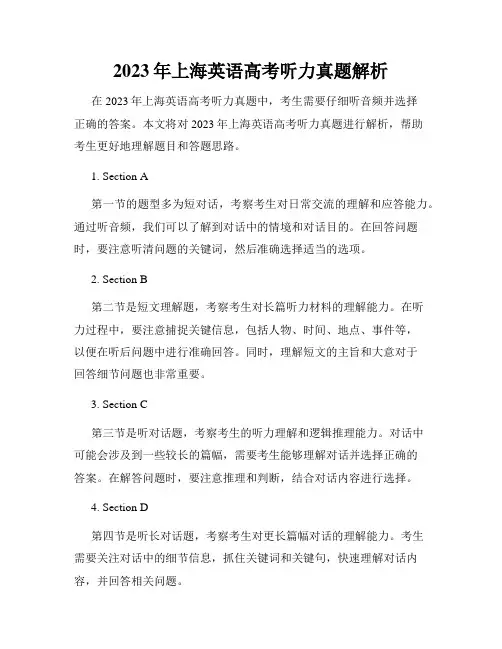
2023年上海英语高考听力真题解析在2023年上海英语高考听力真题中,考生需要仔细听音频并选择正确的答案。
本文将对2023年上海英语高考听力真题进行解析,帮助考生更好地理解题目和答题思路。
1. Section A第一节的题型多为短对话,考察考生对日常交流的理解和应答能力。
通过听音频,我们可以了解到对话中的情境和对话目的。
在回答问题时,要注意听清问题的关键词,然后准确选择适当的选项。
2. Section B第二节是短文理解题,考察考生对长篇听力材料的理解能力。
在听力过程中,要注意捕捉关键信息,包括人物、时间、地点、事件等,以便在听后问题中进行准确回答。
同时,理解短文的主旨和大意对于回答细节问题也非常重要。
3. Section C第三节是听对话题,考察考生的听力理解和逻辑推理能力。
对话中可能会涉及到一些较长的篇幅,需要考生能够理解对话并选择正确的答案。
在解答问题时,要注意推理和判断,结合对话内容进行选择。
4. Section D第四节是听长对话题,考察考生对更长篇幅对话的理解能力。
考生需要关注对话中的细节信息,抓住关键词和关键句,快速理解对话内容,并回答相关问题。
总结:2023年上海英语高考听力真题的解析主要涉及短对话、短文理解、听对话和听长对话四个部分。
考生应该注重细节的捕捉,关注关键词和关键句,同时还要能够运用逻辑推理和判断能力,在有限的时间内准确回答问题。
通过对2023年上海英语高考听力真题的解析,希望能够帮助考生们更好地备考和提高听力水平。
祝愿所有考生都能在高考中取得优异的成绩!。
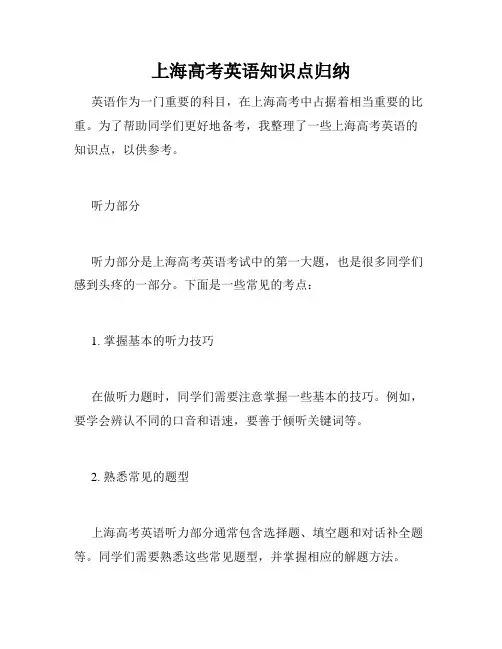
上海高考英语知识点归纳英语作为一门重要的科目,在上海高考中占据着相当重要的比重。
为了帮助同学们更好地备考,我整理了一些上海高考英语的知识点,以供参考。
听力部分听力部分是上海高考英语考试中的第一大题,也是很多同学们感到头疼的一部分。
下面是一些常见的考点:1. 掌握基本的听力技巧在做听力题时,同学们需要注意掌握一些基本的技巧。
例如,要学会辨认不同的口音和语速,要善于倾听关键词等。
2. 熟悉常见的题型上海高考英语听力部分通常包含选择题、填空题和对话补全题等。
同学们需要熟悉这些常见题型,并掌握相应的解题方法。
阅读部分阅读部分是上海高考英语考试中的第二大题,也是很多同学们觉得困难的一部分。
下面是一些常见的考点:1. 快速阅读技巧在完成阅读理解题时,同学们需要掌握一些快速阅读技巧,例如扫读和略读。
这些技巧可以帮助同学们迅速找到关键信息。
2. 掌握常见的题型上海高考英语阅读部分通常包含选择题、判断题和填空题等。
同学们需要熟悉这些常见题型,并掌握相应的解题方法。
写作部分写作部分是上海高考英语考试中的第三大题,同学们需要根据题目要求进行写作。
下面是一些常见的写作考点:1. 提高写作水平提高写作水平是写作部分的关键。
同学们需要多读英文文章,积累词汇和表达方式,同时也要多加练习写作,不断提高自己的写作能力。
2. 掌握常见的写作题型上海高考英语写作部分通常包含议论文、图表作文和书信等。
同学们需要熟悉这些常见题型,并掌握相应的写作技巧。
词汇与语法部分词汇与语法部分是上海高考英语考试中的第四大题,也是很多同学们觉得有难度的一部分。
下面是一些常见的考点:1. 扩大词汇量词汇量的扩大对于英语考试至关重要。
同学们需要通过多读多背,积累常用单词和短语,并掌握它们的用法。
2. 掌握常见的语法知识上海高考英语语法部分常涉及词性、句型和时态等。
同学们需要掌握常见的语法知识,并能够熟练地运用到写作和阅读中。
综上所述,上海高考英语知识点的归纳可以帮助同学们更好地备考,提高自己的英语水平。
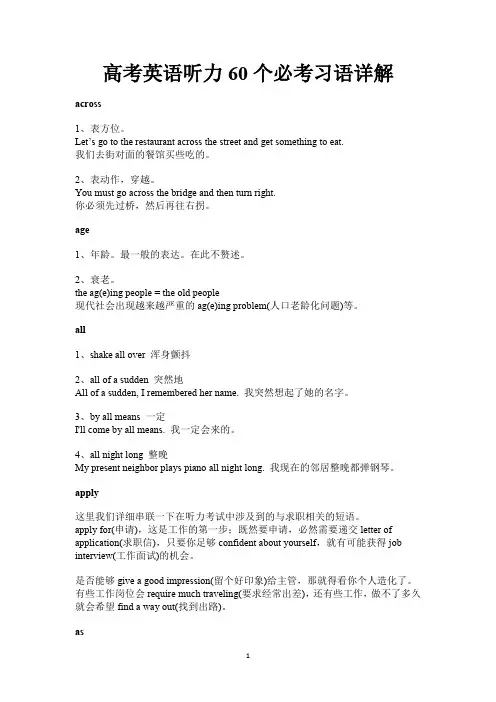
高考英语听力60个必考习语详解across1、表方位。
Let’s go to the restaurant across the street and get something to eat.我们去街对面的餐馆买些吃的。
2、表动作,穿越。
You must go across the bridge and then turn right.你必须先过桥,然后再往右拐。
age1、年龄。
最一般的表达。
在此不赘述。
2、衰老。
the ag(e)ing people = the old people现代社会出现越来越严重的ag(e)ing problem(人口老龄化问题)等。
all1、shake all over 浑身颤抖2、all of a sudden 突然地All of a sudden, I remembered her name. 我突然想起了她的名字。
3、by all means 一定I'll come by all means. 我一定会来的。
4、all night long 整晚My present neighbor plays piano all night long. 我现在的邻居整晚都弹钢琴。
apply这里我们详细串联一下在听力考试中涉及到的与求职相关的短语。
apply for(申请),这是工作的第一步;既然要申请,必然需要递交letter of application(求职信),只要你足够confident about yourself,就有可能获得job interview(工作面试)的机会。
是否能够give a good impression(留个好印象)给主管,那就得看你个人造化了。
有些工作岗位会require much traveling(要求经常出差),还有些工作,做不了多久就会希望find a way out(找到出路)。
as1、作为,当作。
I am working as his teaching assistant.我是他的助教。
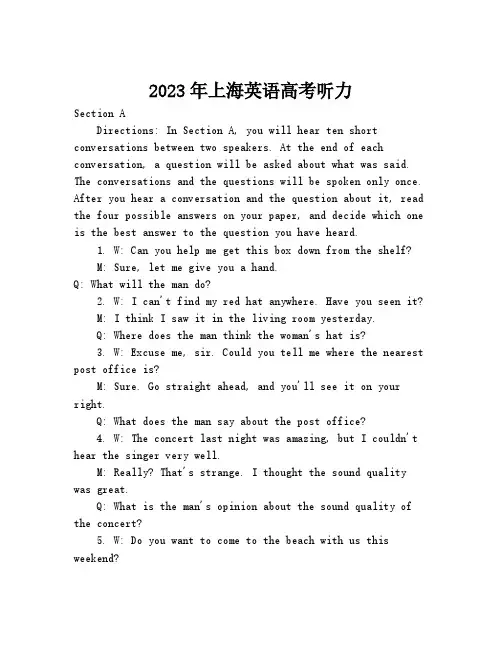
2023年上海英语高考听力Section ADirections: In Section A, you will hear ten short conversations between two speakers. At the end of each conversation, a question will be asked about what was said. The conversations and the questions will be spoken only once. After you hear a conversation and the question about it, read the four possible answers on your paper, and decide which one is the best answer to the question you have heard.1. W: Can you help me get this box down from the shelf?M: Sure, let me give you a hand.Q: What will the man do?2. W: I can't find my red hat anywhere. Have you seen it?M: I think I saw it in the living room yesterday.Q: Where does the man think the woman's hat is?3. W: Excuse me, sir. Could you tell me where the nearest post office is?M: Sure. Go straight ahead, and you'll see it on your right.Q: What does the man say about the post office?4. W: The concert last night was amazing, but I couldn't hear the singer very well.M: Really? That's strange. I thought the sound quality was great.Q: What is the man's opinion about the sound quality of the concert?5. W: Do you want to come to the beach with us this weekend?M: I would love to, but I have to finish my essay for English class.Q: Why can't the man come to the beach with the woman?6. W: It's getting late. We should head back to the hotel now.M: Agreed. Let's call a taxi to take us there.Q: How do the speakers plan to return to the hotel?7. W: Can I borrow your umbrella? It's raining outside.M: Of course. Here you go. Just remember to give it backto me later.Q: What does the man tell the woman to do?8. W: Are you going to the party tonight?M: I'm considering it, but I'm not sure yet.Q: What does the man imply?9. W: How did your interview go yesterday?M: It went really well. The interviewer seemed impressed with my qualifications.Q: What does the man say about his interview?10. W: Do you think we should take the bus or walk to the museum?M: It's not too far. We can easily walk there.Q: What does the man suggest they do to get to the museum? Section BDirections: In Section B, you will hear two passages and one longer conversation. After each passage or conversation, you will be asked several questions. The passages and conversation will be spoken two or three times. They will not be printed in your test book, so you must listen carefully to understand what the speakers are saying.Passage OneHave you ever wondered what it feels like to be inside a volcano? Well, you don't have to wonder anymore because you can actually do it! Located in Iceland, the Thrihnukagigur Volcano offers a unique opportunity for visitors to explorethe insides of an extinct volcano. The volcano's magma chamber, which is the part of the volcano where the moltenrock is stored, has been dormant for over 4,000 years,meaning it's safe for people to enter. Tourists are takendown a 120-meter hole in a special elevator and can witnessthe stunning colors and formations of the volcano's interior. This once-in-a-lifetime experience attracts visitors from all over the world, so make sure to add it to your bucket list! Questions:11. Where is the Thrihnukagigur Volcano located?12. How long has the volcano's magma chamber been dormant?13. What can tourists see inside the volcano?Passage TwoAre you tired of traditional art museums? Well, the Museum of Illusions in New York City might be the perfectplace for you! This unique museum showcases optical illusions, holograms, and mind-bending exhibits that are sure to amaze and confuse visitors. With over 70 exhibits spread across two floors, you can challenge your perception and take fun photos that will leave your friends scratching their heads. From rooms that make you feel like you're walking on the ceilingto installations that appear to move on their own, the Museum of Illusions offers an immersive experience like no other. So, if you're ready to have your mind blown, head over to the Museum of Illusions and prepare to see the world in a whole new way!Questions:14. What does the Museum of Illusions in New York City showcase?15. How many exhibits does the museum have?16. What can visitors experience at the Museum of Illusions?ConversationW: Hi, Mark. Did you know that the new Marvel movie is coming out next week?M: Yeah, I've been counting down the days. I'm a huge Marvel fan!W: Me too! I'm so excited to see all my favorite superheroes come together.M: It's going to be epic. The trailers have been amazing.W: I know, right? I've watched them at least ten times!M: Haha, same here. We should definitely go watch the movie together.W: That sounds like a plan. Let's meet at the theater on Friday night.M: Perfect! I can't wait!Questions:17. What do the speakers have in common?18. What does the woman say about the trailers for the new Marvel movie?19. When are the speakers planning to watch the movie?。
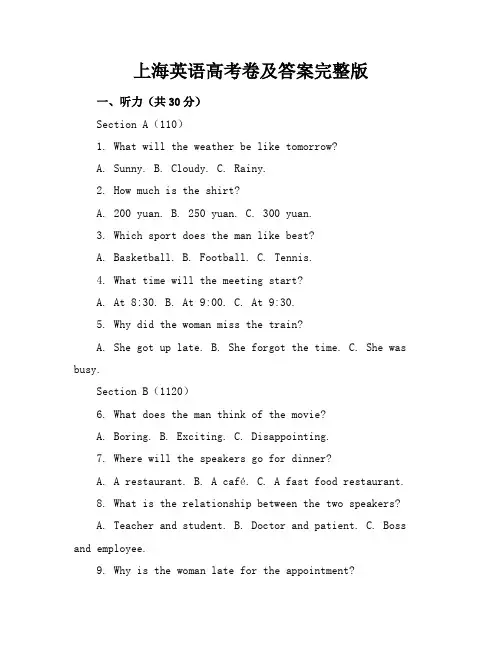
上海英语高考卷及答案完整版一、听力(共30分)Section A(110)1. What will the weather be like tomorrow?A. Sunny.B. Cloudy.C. Rainy.2. How much is the shirt?A. 200 yuan.B. 250 yuan.C. 300 yuan.3. Which sport does the man like best?A. Basketball.B. Football.C. Tennis.4. What time will the meeting start?A. At 8:30.B. At 9:00.C. At 9:30.5. Why did the woman miss the train?A. She got up late.B. She forgot the time.C. She was busy.Section B(1120)6. What does the man think of the movie?A. Boring.B. Exciting.C. Disappointing.7. Where will the speakers go for dinner?A. A restaurant.B. A café.C. A fast food restaurant.8. What is the relationship between the two speakers?A. Teacher and student.B. Doctor and patient.C. Boss and employee.9. Why is the woman late for the appointment?A. She got lost.B. She had a flat tire.C. She missed the bus.10. What is the man's hob?A. Reading.B. Painting.C. Playing the guitar.Section C(2130)1115. Listen to the conversation and choose the best answer.M: Hi, Lily, how was your vacation?W: It was great! I visited my grandparents in the countryside. The air was fresh and the scenery was beautiful.M: Did you do anything special?W: Yes, I helped my grandparents with farm work and picked a lot of fruits.M: Sounds interesting. Did you take any pictures?W: Yes, I took a lot of photos. I'll show you when we get back to school.1620. Listen to the passage and fill in the blanks.The Summer Palace is one of the most famous (16) ______in Beijing. It was built in the 18th century and was once the summer resort of the emperors. The palace is surrounded a beautiful lake and is known for its elegant (17) ______ and traditional Chinese architecture. Visitors can enjoy the beautiful scenery and learn about the history of the palace.2125. Listen to the short talk and answer the questions.What is the main purpose of the talk?A. To introduce a new product.B. To teach people how to save money.C. To encourage people to donate to charity.2630. Listen to the news report and answer the questions.What happened in the city last night?A. A fire broke out in a factory.B. A bomb exploded in a shopping mall.C. A traffic accident occurred on a busy street.二、阅读理解(共40分)Section A(3135)Passage 131. What is the main idea of the passage?A. The importance of the Internet in our lives.B. The drawbacks of the Internet.32. According to the passage, what is one of the most significant problems of the Internet?A. Cybersecurity.B. False information.C. Internet addiction.33. What is the author's attitude towards false information on the Internet?A. Indifferent.B. Concerned.C. Optimistic.Section B(3640)Passage 2The Great Wall is one of the most famous landmarks in China. It was built over two thousand years ago to protect the country from invasions. The wall stretches for more than 21,000 kilometers and is a symbol of Chinese culture and history.Every year, millions of tourists visit the Great Wall. They are amazed the wall's architectural beauty and the breathtaking views it offers. However, the large number of visitors has also caused some problems, such as environmental damage and overcrowding.To solve these problems, the Chinese government has implemented measures to protect the Great Wall and ensure a better experience for visitors. For example, they havelimited the number of visitors and improved facilities.36. What is the main idea of the passage?A. The history of the Great Wall.B. The problems caused tourists at the Great Wall.C一、听力答案Section A: 15 ACBBASection B: 610 CBCAASection C: 1115 ACBCA1620 scenic spots, gardens2125 A2630 A二、阅读理解答案Section A: 3133 BBASection B: 3640 C一、听力知识点1. 基础日常对话理解:考查学生对日常英语对话中信息捕捉的能力,如天气、价格、兴趣爱好等。
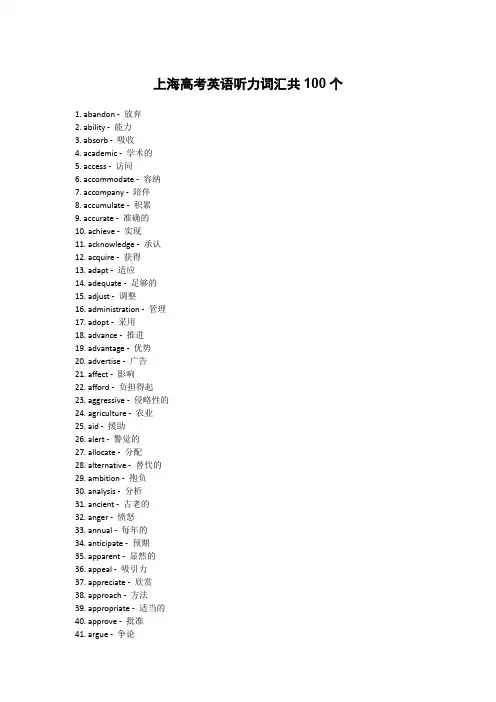
上海高考英语听力词汇共100个1. abandon -放弃2. ability -能力3. absorb -吸收4. academic -学术的5. access -访问6. accommodate -容纳7. accompany -陪伴8. accumulate -积累9. accurate -准确的10. achieve -实现11. acknowledge -承认12. acquire -获得13. adapt -适应14. adequate -足够的15. adjust -调整16. administration -管理17. adopt -采用18. advance -推进19. advantage -优势20. advertise -广告21. affect -影响22. afford -负担得起23. aggressive -侵略性的24. agriculture -农业25. aid -援助26. alert -警觉的27. allocate -分配28. alternative -替代的29. ambition -抱负30. analysis -分析31. ancient -古老的32. anger -愤怒33. annual -每年的34. anticipate -预期35. apparent -显然的36. appeal -吸引力37. appreciate -欣赏38. approach -方法39. appropriate -适当的40. approve -批准41. argue -争论42. arise -出现43. aspect -方面44. assemble -集合45. assess -评估46. assign -分配47. assist -协助48. assume -假设49. assure -确保50. attach -附加51. attain -达到52. attitude -态度53. attribute -属性54. audience -观众55. authority -权威56. aware -意识到的57. balance -平衡58. barrier -障碍59. behavior -行为60. belief -信仰61. benefit -利益62. bias -偏见63. bond -联系64. brief -简短的65. budget -预算66. burden -负担67. calculate -计算68. campaign -运动69. capacity -容量70. capital -资本71. capture -捕捉72. career -职业73. cease -停止74. challenge -挑战75. channel -渠道76. charter -宪章77. clarify -澄清78. classic -经典的79. climate -气候80. code -代码81. collapse -崩溃82. colleague -同事83. commence -开始84. commit -承诺85. commodity -商品86. communicate -沟通87. compare -比较88. compensate -补偿89. compile -编译90. complement -补充91. complex -复杂的92. component -组成部分93. comprise -包括94. compute -计算95. conceive -设想96. concentrate -集中97. concept -概念98. conclude -得出结论99. concrete -具体的100. conduct -进行。
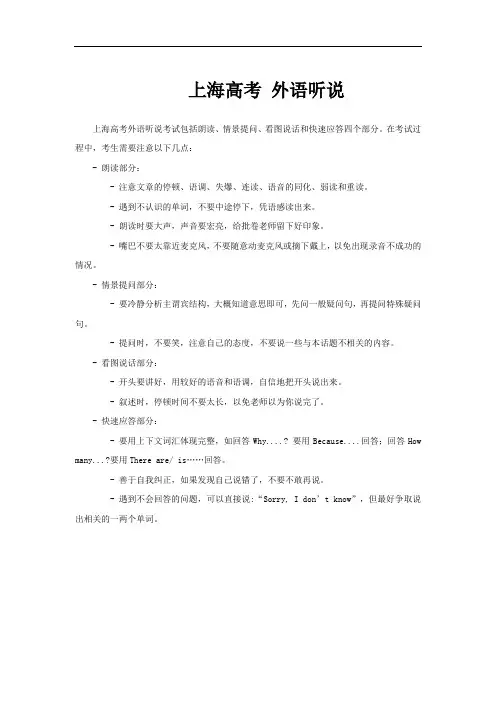
上海高考外语听说
上海高考外语听说考试包括朗读、情景提问、看图说话和快速应答四个部分。
在考试过程中,考生需要注意以下几点:
- 朗读部分:
- 注意文章的停顿、语调、失爆、连读、语音的同化、弱读和重读。
- 遇到不认识的单词,不要中途停下,凭语感读出来。
- 朗读时要大声,声音要宏亮,给批卷老师留下好印象。
- 嘴巴不要太靠近麦克风,不要随意动麦克风或摘下戴上,以免出现录音不成功的情况。
- 情景提问部分:
- 要冷静分析主谓宾结构,大概知道意思即可,先问一般疑问句,再提问特殊疑问句。
- 提问时,不要笑,注意自己的态度,不要说一些与本话题不相关的内容。
- 看图说话部分:
- 开头要讲好,用较好的语音和语调,自信地把开头说出来。
- 叙述时,停顿时间不要太长,以免老师以为你说完了。
- 快速应答部分:
- 要用上下文词汇体现完整,如回答Why....? 要用Because....回答;回答How many...?要用There are/ is……回答。
- 善于自我纠正,如果发现自己说错了,不要不敢再说。
- 遇到不会回答的问题,可以直接说:“Sorry, I don’t know”,但最好争取说出相关的一两个单词。
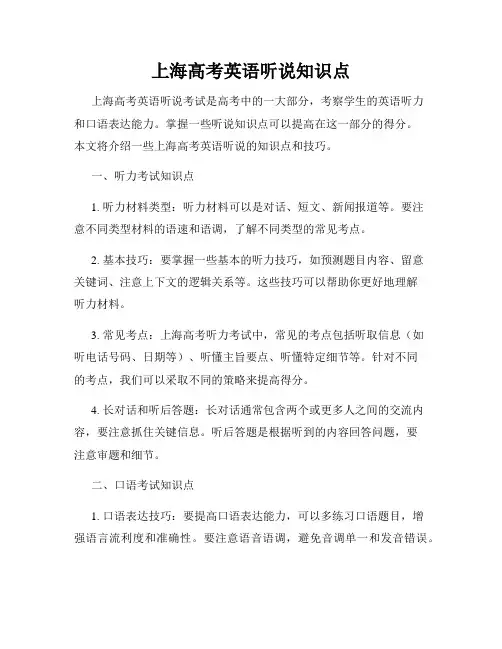
上海高考英语听说知识点上海高考英语听说考试是高考中的一大部分,考察学生的英语听力和口语表达能力。
掌握一些听说知识点可以提高在这一部分的得分。
本文将介绍一些上海高考英语听说的知识点和技巧。
一、听力考试知识点1. 听力材料类型:听力材料可以是对话、短文、新闻报道等。
要注意不同类型材料的语速和语调,了解不同类型的常见考点。
2. 基本技巧:要掌握一些基本的听力技巧,如预测题目内容、留意关键词、注意上下文的逻辑关系等。
这些技巧可以帮助你更好地理解听力材料。
3. 常见考点:上海高考听力考试中,常见的考点包括听取信息(如听电话号码、日期等)、听懂主旨要点、听懂特定细节等。
针对不同的考点,我们可以采取不同的策略来提高得分。
4. 长对话和听后答题:长对话通常包含两个或更多人之间的交流内容,要注意抓住关键信息。
听后答题是根据听到的内容回答问题,要注意审题和细节。
二、口语考试知识点1. 口语表达技巧:要提高口语表达能力,可以多练习口语题目,增强语言流利度和准确性。
要注意语音语调,避免音调单一和发音错误。
2. 话题准备:上海高考口语考试通常有一些预设话题,如个人经历、社会热点、学习和工作等。
要提前准备一些针对这些话题的观点和素材,并且能够进行逻辑连贯的表达。
3. 回答问题技巧:在回答口语题目时,要注意理解问题的意思并给出明确的回答。
要用简洁清晰的语言表达自己的观点,尽量避免啰嗦和口误。
4. 对话交际能力:口语考试中常会有模拟对话的环节。
要注意与对话伙伴的互动,积极参与对话,遵循礼貌和友善的交流方式。
三、备考建议1. 练习听力:多进行听力练习,可以选择一些模拟试题或者英语听力材料来训练自己的听力能力。
要注意听不懂的地方,多反复听,培养听力的敏感度。
2. 口语练习:可以通过与同伴进行口语练习,或者参加口语角、英语角等活动来提高口语表达能力。
还可以模仿一些优秀的口语表达者,学习他们的发音和用词。
3. 多阅读英语材料:通过多阅读英语文章、新闻等,可以扩大词汇量,提高理解能力和阅读速度,对口语表达也有帮助。
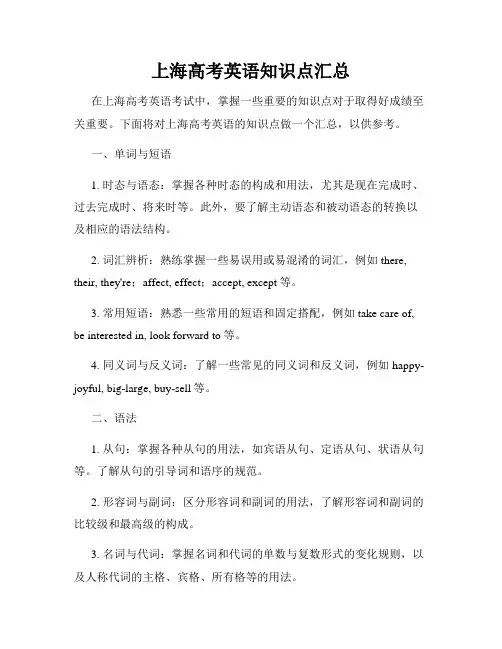
上海高考英语知识点汇总在上海高考英语考试中,掌握一些重要的知识点对于取得好成绩至关重要。
下面将对上海高考英语的知识点做一个汇总,以供参考。
一、单词与短语1. 时态与语态:掌握各种时态的构成和用法,尤其是现在完成时、过去完成时、将来时等。
此外,要了解主动语态和被动语态的转换以及相应的语法结构。
2. 词汇辨析:熟练掌握一些易误用或易混淆的词汇,例如there, their, they're;affect, effect;accept, except等。
3. 常用短语:熟悉一些常用的短语和固定搭配,例如take care of, be interested in, look forward to等。
4. 同义词与反义词:了解一些常见的同义词和反义词,例如happy-joyful, big-large, buy-sell等。
二、语法1. 从句:掌握各种从句的用法,如宾语从句、定语从句、状语从句等。
了解从句的引导词和语序的规范。
2. 形容词与副词:区分形容词和副词的用法,了解形容词和副词的比较级和最高级的构成。
3. 名词与代词:掌握名词和代词的单数与复数形式的变化规则,以及人称代词的主格、宾格、所有格等的用法。
4. 冠词与介词:了解冠词和介词的用法和常见搭配。
三、阅读理解1. 长篇阅读:学会迅速抓住主题思想、段落大意、作者观点等,同时注意识别细节信息。
2. 短文阅读:能够准确理解短文的题目要求,筛选关键词,找出正确答案。
3. 表格填空:掌握提取信息、归纳和总结的技巧,准确填写答案。
四、写作1. 作文结构:了解作文的基本结构,包括引入段、主体段和结尾段,合理使用段落分隔符。
2. 时态与语态:正确运用各种时态和语态,使文章行文连贯。
3. 表达能力:丰富自己的词汇量,合理运用各种句式和语法结构,以提高表达能力。
五、听力1. 短对话理解:通过熟悉日常用语和常见场景,提高听力理解能力。
2. 长对话与短文听力:掌握提取关键信息和主旨要点的技巧,培养听力记笔记的能力。
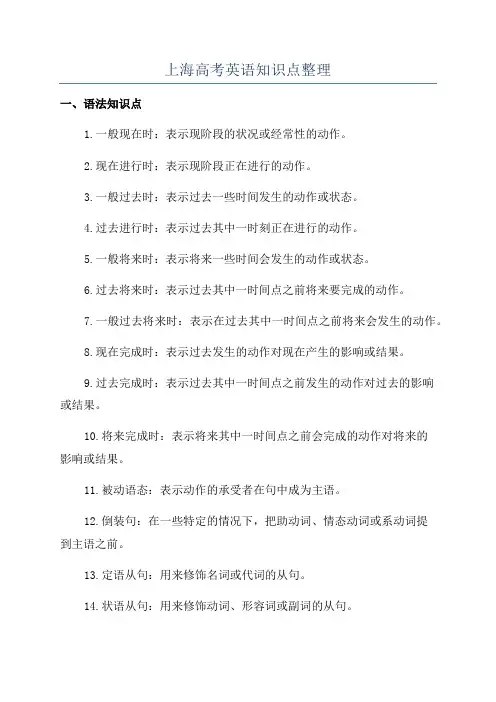
上海高考英语知识点整理一、语法知识点1.一般现在时:表示现阶段的状况或经常性的动作。
2.现在进行时:表示现阶段正在进行的动作。
3.一般过去时:表示过去一些时间发生的动作或状态。
4.过去进行时:表示过去其中一时刻正在进行的动作。
5.一般将来时:表示将来一些时间会发生的动作或状态。
6.过去将来时:表示过去其中一时间点之前将来要完成的动作。
7.一般过去将来时:表示在过去其中一时间点之前将来会发生的动作。
8.现在完成时:表示过去发生的动作对现在产生的影响或结果。
9.过去完成时:表示过去其中一时间点之前发生的动作对过去的影响或结果。
10.将来完成时:表示将来其中一时间点之前会完成的动作对将来的影响或结果。
11.被动语态:表示动作的承受者在句中成为主语。
12.倒装句:在一些特定的情况下,把助动词、情态动词或系动词提到主语之前。
13.定语从句:用来修饰名词或代词的从句。
14.状语从句:用来修饰动词、形容词或副词的从句。
15.名词性从句:在句中充当名词的成分的从句。
16.独立主格结构:在句子中表示伴随、原因、条件等的结构。
17.虚拟语气:表示与事实相反的假设,或表示建议、愿望等。
18.比较级和最高级:表示两个或多个人或物之间的程度、数量或质量的差别。
19.反意疑问句:在陈述句的最后加上简短的疑问句,用来征求对方的意见或肯定。
20.并列连接词:用来连接两个或多个平行的词、词组或句子。
二、词汇知识点1.同义词和反义词的辨析。
2.高频词汇的运用,如常用动词、名词、形容词、副词等。
3.常用短语的运用,如动词短语、名词短语、形容词短语等。
4.词义辨析,如词的不同用法、词组和固定搭配等。
三、阅读理解知识点1.根据上下文推断词义。
2.根据上下文理解段落主旨。
4.理解文章的结构和组织方式,如因果关系、对比关系、时间顺序等。
5.掌握不同类型文章的阅读技巧,如记叙文、说明文、议论文等。
6.把握文章中的重点信息和细节。
7.理解文章中的引申意义和隐含信息。
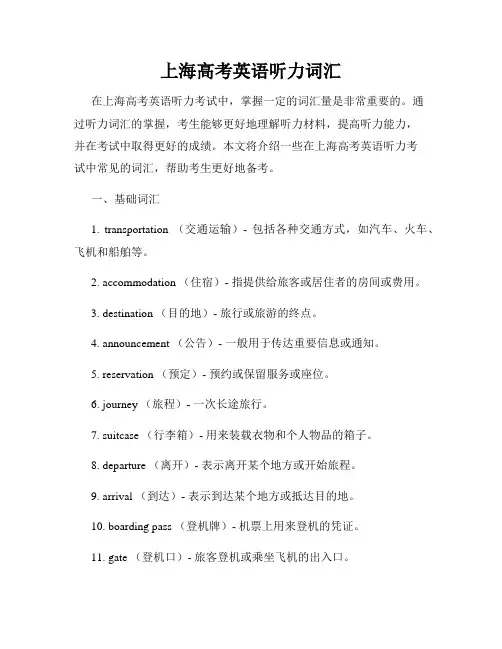
上海高考英语听力词汇在上海高考英语听力考试中,掌握一定的词汇量是非常重要的。
通过听力词汇的掌握,考生能够更好地理解听力材料,提高听力能力,并在考试中取得更好的成绩。
本文将介绍一些在上海高考英语听力考试中常见的词汇,帮助考生更好地备考。
一、基础词汇1. transportation (交通运输)- 包括各种交通方式,如汽车、火车、飞机和船舶等。
2. accommodation (住宿)- 指提供给旅客或居住者的房间或费用。
3. destination (目的地)- 旅行或旅游的终点。
4. announcement (公告)- 一般用于传达重要信息或通知。
5. reservation (预定)- 预约或保留服务或座位。
6. journey (旅程)- 一次长途旅行。
7. suitcase (行李箱)- 用来装载衣物和个人物品的箱子。
8. departure (离开)- 表示离开某个地方或开始旅程。
9. arrival (到达)- 表示到达某个地方或抵达目的地。
10. boarding pass (登机牌)- 机票上用来登机的凭证。
11. gate (登机口)- 旅客登机或乘坐飞机的出入口。
二、旅行词汇1. ticket (车票/机票)- 用于乘坐交通工具进入或离开某地的凭证。
2. timetable (时刻表)- 指列有车次、班次或航班等出行信息的表格。
3. platform (站台)- 用于乘坐火车或长途汽车的地方。
4. coach (长途汽车)- 一种用于长途旅行的大型巴士。
5. destination (目的地)- 指旅行或旅游的终点。
6. scenic spot (风景名胜)- 旅游中令人愉悦或令人赞叹的景点。
7. guidebook (旅游指南)- 提供旅行建议和信息的书籍。
8. foreign currency (外币)- 在国外使用的货币。
9. visa (签证)- 允许持有人在外国停留或入境的文件。
上海英语高考知识点归纳与总结随着中国高考的改革,英语科目在上海高考中扮演着越来越重要的角色。
对于广大高中生而言,掌握英语高考知识点是取得优异成绩的重要保障。
本文将对上海英语高考知识点进行归纳与总结,帮助学生们更好地复习备考。
一、听力部分1. 听力题型分类上海英语高考听力部分题型主要包括选择题、填空题和听写题。
其中,选择题占比最大,所以重点复习此类题目。
2. 听力技巧(1)培养听力习惯:多听英语材料,包括英语歌曲、电影、广播剧等,提高对英语的感知力。
(2)注意听清关键信息:在听力练习中,要抓住关键词和数字。
(3)积累常用词汇:扩充词汇量是提高听力能力的基础,要多进行词汇积累。
二、阅读理解部分1. 阅读题型分类上海英语高考阅读理解部分题型主要包括选择题、配对题和段落填空题。
选择题是考察考生对文章细节的理解能力,配对题考察考生对文章整体理解能力,段落填空题则测试考生对文章结构的理解。
2. 阅读技巧(1)快速阅读:在有限时间内,通过快速浏览文章,获取整体理解,抓住文章的中心思想。
(2)留意关键词:正确理解问题的关键词,帮助筛选正确答案。
(3)仔细推敲选项:根据文章的语境和逻辑思维,排除干扰选项,选择正确答案。
三、完形填空部分1. 完形填空题型分类完形填空题主要考察考生对上下文语境的理解能力,并培养学生的语感和语言表达能力。
2. 完形填空技巧(1)注意揭示线索:通过前后句之间的连接词和代词等线索,推测出正确答案。
(2)注意上下文的逻辑关系:根据上下文的语境,推测词语的意思和句子的逻辑关系。
四、写作部分1. 写作要求上海英语高考写作部分要求学生能够表达自己的观点和理由,并结合实例进行说明。
写作内容可以是议论文、应用文、信件等。
2. 写作技巧(1)选择适当的词汇和句式:通过使用丰富的词汇和多样化的句式,提升文章的表达能力。
(2)合理组织文章结构:文章应包括引言、论点、论据和结论,合理组织段落结构,使观点有条理地呈现。
上海高考英文必考知识点英语是高中阶段的一门必修科目,也是每年参加高考的必考科目之一。
对于上海的高考生来说,英语的考试成绩对于大多数人来说都非常重要。
因此,了解并掌握高考英语的必考知识点是非常必要的。
本文将介绍上海高考英语必考知识点,并提供相关学习建议。
首先,上海高考英语的必考知识点包括词汇、语法、阅读和写作。
其中,词汇是构建语言基础的重要组成部分。
高考英语中常考的词汇包括常用词汇、短语和固定搭配。
建议同学们背诵并熟练运用这些词汇,在写作和阅读理解中能够更准确地理解和表达自己的意思。
其次,语法也是高考英语的重要考点之一。
语法知识包括动词时态、语态、连接词、代词和句子结构等。
学生们应重点掌握各类句子结构的用法,以及动词时态和语态的使用规则。
通过大量的练习和语法习题,提高语法的准确性和灵活运用能力。
阅读理解是上海高考英语中的重要部分。
考生需要阅读各种题材和形式的文章,并回答相关问题。
为了更好地应对高考阅读理解题目,建议同学们提前积累并拓展阅读素材。
每天阅读一些英文材料,如英文报纸、文学作品或者关于各个领域的文章,提高阅读理解能力。
写作能力也是高考英语中的一项重要考察内容。
写作题目通常涉及观点陈述、图表描述、图画作文和议论文等。
为了提高写作能力,建议同学们多写作文,并请教老师和同学对自己的作文进行评价和修改。
此外,阅读一些高质量的英文范文也是提高写作水平的好方法。
除了掌握必考知识点外,提前了解高考英语考试的题型和时间分配也很重要。
上海高考英语卷分为听力、阅读理解、完形填空和写作等几个部分。
考生应该知道每个部分的题型和每个题型所占的时间比例,合理安排考试时间。
最后,坚持做题和模拟考试也是提高英语成绩的重要方法。
每天进行适量的英语习题,熟悉各种题型的要求和解题技巧。
此外,定期参加模拟考试,并认真分析自己的考试成绩,找出自己的不足并加以改进。
总结起来,上海高考英语的必考知识点包括词汇、语法、阅读和写作。
通过合理的学习方法和练习,掌握这些知识点对于取得好的成绩非常重要。
上海2023高考英语听力一、综述上海2023年高考英语听力部分是考生考察听力理解能力的重要环节。
在这一考试中,考生需要通过听取录音材料,回答一系列与录音相关的问题。
以下是对上海2023高考英语听力部分的一些综述性分析和建议。
二、考试任务1. 考题形式上海2023高考英语听力部分主要采用选择题形式,考生需要根据所听到的录音内容,选择正确的答案。
选择题包括单选、多选和填空题。
2. 考试内容考试内容主要涵盖以下几个方面:a. 日常生活场景:包括购物、旅行、问路等常见场景。
b. 学校生活:包括教室、图书馆、实验室、活动等学校相关话题。
c. 社交交流:包括与他人打招呼、介绍自己、询问他人情况等。
d. 公共信息获取:包括广播、公告、导览等公共信息的获取和理解。
三、应试技巧1. 提前熟悉题型在参加考试前,考生应该仔细研究上海2023高考英语听力部分的题型及要求。
了解不同题型的出题方法和答题技巧,可以提高做题的准确性。
2. 养成听力习惯培养良好的听力习惯是提高听力能力的关键。
平时可以通过听英语歌曲、英语新闻等方式锻炼听力,加强对英语语音、语调和语速的理解。
3. 注意听力过程中的重点在听力过程中,要注意聚焦关键信息,例如数字、时间、地点等。
这些信息通常与问题的答案直接相关,抓住这些重点能够更好地理解录音内容。
4. 提前预测答案在听录音之前,可以先仔细阅读问题,提前预测答案的可能内容。
这样在听录音时,可以更有针对性地去寻找关键信息,提高答题效率。
5. 多做练习通过多做听力练习,可以熟悉题型,掌握常见的听力技巧,提高对不同场景的听力理解能力。
可以利用真题、模拟题以及在线资源进行练习。
6. 注意听力材料的变化考生应该关注最新的高考大纲和考试说明,了解可能出现的新题型和考试要求。
在备考过程中,要关注相关的听力材料和模拟题,以熟悉不同种类和风格的录音材料。
四、备考建议1. 培养良好的英语听力习惯平时可以多听一些纯英语的录音材料,可以是英语新闻、英语广播剧或者英语电影,以提高对英语语音、语调和语速的适应能力。
2024年高考英语听力题考点大纲高考英语听力一直是众多考生关注的重点,了解其考点对于备考至关重要。
以下为大家详细梳理 2024 年高考英语听力题的考点,帮助同学们更有针对性地进行复习。
一、语音知识1、元音和辅音的准确发音包括长元音、短元音、双元音的区分,以及清辅音、浊辅音的辨别。
考生要能清晰听出单词中的元音和辅音发音,准确判断所听到的单词。
2、重音和语调单词的重音位置会影响词义,句子的语调则能反映出说话者的语气和态度。
例如,升调通常表示疑问或不确定,降调则表示肯定或结束。
3、连读和弱读连读在英语听力中非常常见,如“an apple”会连读成“an ˈnæpl”。
弱读现象如“and”会弱读成“ən”。
熟悉这些规则有助于更流畅地理解听力内容。
二、词汇1、常见场景词汇高考听力常常涉及日常生活、学习、工作等场景,如学校(classroom、teacher、student)、家庭(father、mother、sister)、购物(shop、price、discount)、旅游(hotel、airport、sightseeing)等。
2、同义词和近义词听力中可能会用不同的词汇表达相同或相近的意思,考生要能迅速理解并做出反应。
3、一词多义有些单词有多种含义,在不同的语境中意思不同,例如“bank”有“银行”和“河岸”的意思。
三、语法1、时态一般现在时、一般过去时、现在进行时、过去进行时、一般将来时等时态在听力中经常出现。
通过动词的形式和时间状语来判断时态,理解所表达的动作发生的时间。
2、语态主动语态和被动语态的辨别,了解句子的主语是动作的执行者还是承受者。
3、句子结构简单句、复合句(宾语从句、定语从句、状语从句等)的理解。
能够抓住句子的主干,准确理解句子的意思。
四、听力理解技巧1、预测内容在听之前,根据题目和选项预测可能听到的内容,有针对性地去听。
2、抓关键信息注意听力材料中的数字、时间、地点、人物、事件等关键信息。
✧abstract adj/n.抽象的;摘要✧burst v.爆裂,突然发出break v/n.打破,违反;暂停,破裂→n.暂停interval n.间隔,中间休息external adj.外面的,外部的✧announce vt.宣布,通告announcement n.宣布pronounce vt.宣称pronunciation n.发音✧good adj.好的goodness n.善,美德goods n.商品,货物✧harm vt/n.伤害,损害,危害harmony n.和睦,融洽,友好,和谐destroy vt.破坏,拆毁,消灭ruin vt.破坏damage vt/n.破坏site n.场所,地点,选址✧remain vi.留下,保持不变,剩余建议收藏下载本文,以便随时学习!✧construct v.建造,构造=put up=set upinstruct vt.讲授,指示✧post n/vt.柱,邮政,职位;张贴,邮寄store vt/n.储存;商店--storagecover vt/n.遮盖;封面,盖子--coverageorphan n/adj.孤儿;孤儿的--orphanagemarry vt/vi.结婚--marriagecook n.厨子;烹调--cooker✧sometime adv.某个时候sometimes adv.有时=from time to timesome time在某个时候some times几次✧time n.时间timetable n.时刻表✧want vt.想要我去人也就有人!为UR扼腕入站内信不存在向你偶同意调剖沙wonder v/n.想知道,惊叹;奇迹,疑惑marvelous adj.令人惊奇的,奇特的wander vi.徘徊,闲逛✧promise v/n.承诺✧mobile adj/n.活动的,移动的;汽车mode n.方式,形式,风尚model n.模型modern adj.现代化的modest adj.谦虚的moderate adj.适度的,中等的medium adj/n.中间的,适度的;媒介物,传媒media radium n.镭stadium n.体育场✧material n.材料medal n.奖牌,纪念章metal n.金属mention vt/n.精神的,智力的,内心的mental adj.精神的,智力的✧order n/vt.整齐,秩序;命令,整理orderly adj.整齐的,有秩序的disorder n.杂乱,混乱disorderly adj.杂乱的,混乱的✧form n/vt/vi.形成,表格;构成,组成建议收藏下载本文,以便随时学习!我去人也就有人!为UR扼腕入站内信不存在向你偶同意调剖沙inform vt.通知,告知reform v/n.改革transform vt.改造,改革translate v.翻译,转变transplant vt.移植transport vt.运输,输送transportation n.交通工具,客运,货运transfer v.搬,转动,转换✧interrupt vt.打断,打扰interpreter n.解释,说明,翻译✧lie vi/n.躺,位于(lay,lain)✧vt.说谎(lied lied)lay vt.放下,产卵,铺设(laid laid)layer n.层✧present n礼物=gift✧vt.赠送,授予,呈现✧adj.现在✧adj.出席的,到场的represent vt.代表✧expose vt.暴露,揭露✧interview n/vt.采访,面试建议收藏下载本文,以便随时学习!我去人也就有人!为UR扼腕入站内信不存在向你偶同意调剖沙✧employ vt.雇佣,使用✧apply v.申请,应用appliance n.器具device n.装置;instrument n.仪器,乐器implement n/vt.工具,用具;tool n.工具✧pass v/n.传递,经过,通过;通行证message n.信息✧point v/n.指出;小数点✧sense n.感觉✧vt.意识到realize vt.实现,认识,体会aware adj.意识到→be aware of建议收藏下载本文,以便随时学习!nonsense n.胡说,废话✧case n.实例,事例suitcase n.行李箱circumstance n.情况,境遇(常用复数)(situation) account n/vi.叙述,账户账目;解释,说明accountant n.会计人员mean vt/adj.意味着;平庸,卑鄙,中间的meaning n.意义,意思means n.方法手段meantime n.间隔时间meanwhile adv.同时✧due adj.应得的,到期的,预定的because conj.因为owe vt.归功于owing adj.欠着的,未付的own adj/vt.由于,因为owner n.所有者✧state n/v.国家,状态;声明✧qualify v.使具有资格的quality adj/n.优质的;性质,特性,品质,质量,品质quantity n.量,数量✧provide vt.供给,提供supply n/vt.供应,供应物;供给offer vt.提供,提议,开价建议收藏下载本文,以便随时学习!我去人也就有人!为UR扼腕入站内信不存在向你偶同意调剖沙afford vt.买得起,承担offend vt.冒犯,得罪offence n.冒犯行为,过错defend vt.防御,辩护defence n.防御,辩护defeat vt/n.击败✧able adj.有能力,能干的capable n.有能力✧cover n/vt.封面;遮盖,采访,掩盖,占地面积discover vt.发现recover v.寻回,恢复✧other adj.别的,其他的another adj/pron.另一个✧favour n/vt.恩惠,善行;喜爱,支持favourite adj.最爱的approve vt.赞成approval n.赞成disapproval n.不赞同disapprove v.不赞同✧propose vt.建议proposal n.建议建议收藏下载本文,以便随时学习!我去人也就有人!为UR扼腕入站内信不存在向你偶同意调剖沙✧sure adj/adv.确信的,可靠的,有把握的;确实assure vt.保证,承担ensure vt.保证insure vt/vi.给保险insurance n.保险✧certain adj.确定的,有把握的curtain n.幕contain vt.包含,容纳=include=seatcontainer n.集装箱,容器seat n/vt.座位;就坐;容纳obtain vt.得到✧digest vt/n.消化吸收;摘要✧former adj.前者✧late adj/adv.迟的,晚的recent adj.新近的,近来的✧congratulate vt.祝贺congratulation n.祝贺celebrate vt.庆祝✧count v.计算,数counter n/v.柜台;应对encounter vt/n.意外的相遇,邂逅=meet=come across account n/vi.叙述,账户账目;解释,说明建议收藏下载本文,以便随时学习!我去人也就有人!为UR扼腕入站内信不存在向你偶同意调剖沙accountant n.会计人员calculate n.计算,估计calculator n.计算器depend vi.依靠,依赖dependent adj.依赖的,依靠的✧focus v/n.集中,聚焦✧concentrate v.集中concentration n.专心,集中✧depend vt.依赖依靠dependence→independence n.独立dependent→independent adj.独立的✧operate v.工作,运转,活动,操作operation n.操作,经营,营业,手术operator n.操作员,话务员cooperate vi.合作,配合✧lose vt/vi.失去,损失✧touch v/n.触摸,触及,涉及tough adj.坚韧的,困难的,强硬的,固执的rough adj.粗糙的,崎岖的,粗制的cough v/n.咳嗽cotton n.棉花✧agree v.同意agreeable adj.令人愉快的disagreeable adj.不合意的,令人不快的grant vt/n.同意,授予,承认建议收藏下载本文,以便随时学习!✧decide v.决定decision n.决定determine vt/vi.决定determination n.决心,坚定,果断,确定✧divide vt.分开division n.部门,分开separate adj/vt.分开,划分,区分✧explode v.爆炸,爆发guy n.家伙,小子✧include vt.包括conclude v.结束,推断出conclusion n.结束,结论,推论exclude vt.排斥在外,不包括exclusion ✧persuade vt.说服✧general adj.普遍的,一般的general idea文章大意generation n.一代人generous adj.慷慨的,大方的✧curious adj.好奇的✧differ vi.不同different adj.不同的,有区别的aspect n.方面inspect vt/vi.检查,检阅,视察建议收藏下载本文,以便随时学习!我去人也就有人!为UR扼腕入站内信不存在向你偶同意调剖沙prospect v/n.勘察;预期,景色,前景respect n/vt.尊敬,重视,方面respectively adv.各自的expect vt.期待,预料suspect vt/n.推测,察觉,怀疑;嫌疑犯doubt vt/n.怀疑✧country n.国家,乡下countryside n.乡下county n.郡league n.联盟,协会✧city n.城市citizen n.公民town n.城镇urban adj.城市的rural adj.农村的valley n.山谷,溪谷village n.村庄civil adj.国内的,公民的civilian n.平民civilization n.文明civilize v.使开化✧fail vi/vt.失败,不及格,衰退failure n.失败,故障✧succeed v.成功,继承success n.成功,成就,胜利✧consider vt.考虑,认为considerate adj.考虑周到的建议收藏下载本文,以便随时学习!我去人也就有人!为UR扼腕入站内信不存在向你偶同意调剖沙✧worth prep/n.值得;价值worthy adj.值得的,值得敬重的worthless adj.无价值的price n.价格prize n.奖品worthwhile adj.值得的valuable adj.有价值的,有用的value n/vt.价值;重视✧face n/v.面孔;面对fascinate vt.迷住,吸引✧express n/vt.快车,快递;表达,表示expression n.表达,表示,表情,短语phrase n.短语✧admit vt.承认,准许进入admission n.准许进入allow vt.允许=permit✧earth n.陆地✧once adv.一次✧contact n/v.联系,接触connect vt.连接,联系combine v.结合combination n.结合contract n/v.合同;订立合同,感染contrary n.相反contrast n.对比✧press v/n.压平;报刊,新闻舆论pressure n.压力stress n.压力,紧张,强调,重音depress vt.丧气,压下,抑郁oppress vt.压迫,压制impress vt.印象深刻impression n.印象✧condition n/vt.环境,状况建议收藏下载本文,以便随时学习!我去人也就有人!为UR扼腕入站内信不存在向你偶同意调剖沙air-conditioned adj.有空调的surround n/adj.包围,环绕surrounding n/adj.周围的事物;周围的environment n.环境(自然环境)situation n.情况,处境,场面✧charge v/n.主管,费用,充电,控告✧blame vt/n.责怪✧devote vt.奉献,专用于=dedicatedelicate adj.纤细的,雅致的,易碎的debate v/n.辩论contribute v.贡献contribution n.贡献distribute vt.分发,配送✧courage n.勇气,勇敢encourage vt.鼓励,激励discourage vt.阻止,阻拦✧art n.美术,文科(s)artificial adj.人工的,人造的article n.文章建议收藏下载本文,以便随时学习!我去人也就有人!为UR扼腕入站内信不存在向你偶同意调剖沙✧text n/vt.短信,发送短信context n.上下文,语境,背景,环境contest n.竞赛,比赛test n/vt.实验,测试,化验,考验quiz n.测试quit v.停止,放弃,离开examination n.考试,检查,检测examine vt.测试✧science n.科学scientist n.科学家scientific adj.科学的,细致严谨的specific adj.明确的,特定的,具体的✧willing adj.愿意的,乐意的reluctant adj.不情愿的,勉强的relevant adj.有关的,切题的✧crazy adj.疯狂的,荒唐的✧worry v/n.担心,发愁✧anxious adj.焦虑的,急切的✧particular adj.特殊的,特定的participant n.参与者participate vi.参与particularly adv.特别,尤其✧critical adj.批评的,挑剔的,至关重要的,危急的建议收藏下载本文,以便随时学习!我去人也就有人!为UR扼腕入站内信不存在向你偶同意调剖沙critic n.批评家criticism n.批评,评论criticize v.批评,评论,指责criticism批判主义✧fault n.缺点,错误✧look vi/vt.看,显得✧drop n/v.滴;落下,掉下✧all adj/pron/adv.所有的,完全✧call vt/vi/n.大声说出;叫喊;呼叫✧assemble v.集合,装配tremble vi.颤动gather vt/vi.集合,聚集,收集✧afraid adj.害怕建议收藏下载本文,以便随时学习!我去人也就有人!为UR扼腕入站内信不存在向你偶同意调剖沙✧assist v.协助,帮助assistant n.助手✧insist v.坚持,坚持认为stick n/v.枝条,棍棒;黏贴,刺strike v/n.敲击,打击,罢工persevere vi.坚持不懈persist vi.执意resist v.抵抗resistant adj.抵抗的consist vi.由组成,构成,在于✧compose v.组成,创作composer n.作曲家composition n.组成,作文,作品✧engage vt/vi.使订婚,使从事,吸引✧develop vt/vi.开发,发展,生长,发育✧crime n.罪行criminal adj.犯罪的✧commit vt.犯罪,委托,提交committee n.委员会✧relate v.叙述,有关联related adj.有关的relation n.关系relationship n.关系relative n/adj.亲属;比较的,相对的建议收藏下载本文,以便随时学习!我去人也就有人!为UR扼腕入站内信不存在向你偶同意调剖沙relatively adv.比较而言,相对的relativity n.相关性,相对论✧probable adj.很可能发生probably adv.很可能(80%)likely ad/adv.可能;很可能(50%)alike adv/adj.相似的,一样的dislike vt/n.不喜欢✧resource n.资源✧rely vi.依靠,依赖✧close v/adj.关闭;接近的,靠近的enclose vt.围住,包住,封入open adj.打开opener n.开启者opening adj/n.开始的;开端✧sleep v/n.睡眠sleepy adj.困倦的asleep adj.睡着的✧warm adj/v.温暖的,热切的;温暖,暖和warm-hearted adj.热心的warmth n.缓和,温暖,热情warn v.警告,告诫rob v.抢劫,剥夺robber n.强盗,盗贼robbery n.抢劫案✧demand vt/n.要求,需求,询问建议收藏下载本文,以便随时学习!我去人也就有人!为UR扼腕入站内信不存在向你偶同意调剖沙demanding adj.高要求的command n/vt.命令,指挥,掌握commander n.司令官,指挥官✧intend vt.打算,计划intense adj.强烈的,剧烈的,紧张的intention n.意图,目的pretend v.假装tend v.照管,护理tendency n.易于,趋向于tender adj.嫩的,温柔的,亲切地trend n/vi.走向,趋向✧long vi/adj.渴望;长的long-term adj.长期的✧pick v.采摘✧put vt.放✧note n/vt.笔记,纸币notebook n.笔记本✧catch vt.捉住,赶上,钩住建议收藏下载本文,以便随时学习!我去人也就有人!为UR扼腕入站内信不存在向你偶同意调剖沙✧require v.需要,要求requirement n.必需品,需要,规定request vt/n.要求,请求acquire vt.获得,学到inquire v.询问inquiry n.询问✧imagine vt.想象imaginary adj.想象中的,虚构的imagination n.想象力image n.映像,形象fancy n/v.想象力;想象fantastic adj.奇异的,了不起的✧advise vt.劝告,建议advice n/vt.劝告,忠告✧suggest vt.暗示,建议,推荐,表明✧achieve vt.完成,实现,达到achievement n.成就accomplish vt.实现,完成,达到fulfill vt.履行,满足complete vt/adj.完成;完整的,十足的completion n.完成incomplete adj.不完全的compete vi.比赛,竞争competition n.竞争,比赛competitive adj.有竞争力的✧forbid vt.禁止prevent vt.阻止,妨碍ban vt/n.阻止,取缔;禁令建议收藏下载本文,以便随时学习!我去人也就有人!为UR扼腕入站内信不存在向你偶同意调剖沙stop v/n.阻塞,停止,阻拦;车站,阻止nonstop adj.不停地prohibit vt.禁止,阻止exhibit n/vt.展览品;展出,展示exhibition n.展览会✧previous adj.先前的=formerprecious adj.珍贵的=valuable✧result n/vi.结果;产生consequence n.结果,后果✧subject n.学科,科目,主题,题材✧object v/n.反对;宗旨,物体objective adj/n.客观的,如实的;目标inject vt.注射reject vt.拒绝project n.计划,方案,工程,课题✧affect vt.影响,使感动affection n.喜爱,慈爱effect n.影响,结果,效力effective adj.有效的,生效的impact n/v.影响,作用;冲击,撞击influence vt/n.影响influential adj.有影响的✧speak v.说,讲建议收藏下载本文,以便随时学习!✧proud adj.自豪的,骄傲的✧part n/vi.部分,零件,地区;分开role n.角色partner n.同伴,合伙人depart vi.离开,出发department n.部门departure n.离开,启程,出发,背离apart adv.分开的apartment n.公寓✧act vi/n.行动,表演,扮演;行为,法令exact adj.精确地,确切的react vi.做出反应,起作用active adj.积极地,主动地activity n.活动actor n.男演员actress n.女演员actual adj.事实上action n.行动measure v/n.测量✧come vi.来outcome n.结果income n.收入,所得,收益newcomer n.新来的人✧overlook vt.忽视,眺望,俯瞰guilty adj.有罪的,内疚的ignore vt.忽略,不顾建议收藏下载本文,以便随时学习!我去人也就有人!为UR扼腕入站内信不存在向你偶同意调剖沙ignorance n.无知ignorant adj.无知的neglect vt/n.疏忽,忽略negative adj.负面的,消极的negotiate v.谈判skip v.跳绳,跳过,漏过✧overoverall adj.总的,包括一切的overcome vt.克服overflow vi/n.溢出overhead adj/adv.在头顶上的,上面的overnight adv.整个夜间overtake vt.赶上,超过✧assess vt.评估,评价access n.接近,进入,利用inaccessible adj.达不到的,不可接近的✧suppose v.假定,猜想✧direct vt/adj.指导,命令;笔直的,直接的direction n.方向,说明director n.主管,经理,导演✧prefer vt.更喜爱✧add v.添加建议收藏下载本文,以便随时学习!addition n.加additional adj.附加的✧hang v.悬挂suspend v.悬挂,悬浮✧refer vi.提到,参考reference n.参考,参阅✧run v.跑,竞选,运转,管理,经营runner n.跑步者✧firm adj/n.坚固的;商行confirm vt.证实,确认✧satisfy vt.使满意,满足satisfaction n.满意,满足,快乐的事satisfactory adj.令人满意的content n/adj/v.目录,内容;满意的;使满足✧drama n.剧本,戏剧dramatic adj.令人印象深刻的建议收藏下载本文,以便随时学习!我去人也就有人!为UR扼腕入站内信不存在向你偶同意调剖沙✧industry n.工业,行业,勤劳industrial adj.工业的,产业的industrialize vt/vi.使工业化agriculture n.农业commerce n.商业,贸易commercial adj/n.商业的,商务的;商业广告business n.生意,工作,公司,商店busy adj.繁忙的✧attend v.出席,参加,护理attention n.注意力deny vt.否认,拒绝→bury vt.memory n.✧tempt vt.吸引attempt vt/n.企图,尝试✧try v.尝试,试验,试图,审讯,努力✧trade n/v/adj.贸易,商业;进行贸易,交换;贸易的inherit vt.继承inhabitant n.居民settle v.定居,安顿下来,确定,解决settler n.移居者immigrate v.入境居住immigrant n.移民建议收藏下载本文,以便随时学习!我去人也就有人!为UR扼腕入站内信不存在向你偶同意调剖沙✧hit v/n.击,碰撞beat v/n.打败,跳动;敲打,跳动✧describe vt.描述,形容description n.描写,叙述,形容absorb vt.吸收,理解✧assume vt.假定,承担consume vt.消耗,消费,耗尽consumer n.消费者,顾客resume n.摘要,梗概✧custom n.风俗习惯,惯例customer n.顾客accustomed adj.适应了的✧economy n.经济economic adj.经济的economical adj.节约的✧history n.历史historic adj.历史上意义重大的historical adj.历史的classic adj/n.经典的,一流的;经典作品classical adj.古典的✧electric adj.电的electrical adj.电的,与电有关的electrician n.电气专家electricity n.电electron n.电子electronic adj.电子的✧evident adj.明显的=apparent=observable]evidence n.证据obvious adj.显然的建议收藏下载本文,以便随时学习!我去人也就有人!为UR扼腕入站内信不存在向你偶同意调剖沙apparent adj.显然的clear adj/vt.清楚地,明朗的;清除,清扫✧deserve vt.应得,值得observation n.观察,注意reserve vt.保留,储备preserve vt.保存,保留serve v.服务,起作用,接待顾客severe adj.严重的,严格的,严厉的service n.服务,接待顾客servant n.仆人,佣人✧tense adj/n.紧张的,紧绷的;时态nerve n.神经,胆量,魄力nervous adj.紧张的serious adj.严重的,严肃的,当真的severe adj.严重的,严格的,严厉的✧plan vt/n.计划,打算plane n.飞机aeroplane n.飞机planet n.行星fight vt/vi/n.打仗,反对;战斗,打架flight n.航班,飞行✧place vt/n.放置,安置;地方,场所palace n.宫殿plate n.盘子plant n/v.植物,工厂;种植plantation n.植物园✧associate vt.联系,联合association n.联合,协会union n.结合,联合,团结,工会community n.社区,团体communicate v.传达,传递建议收藏下载本文,以便随时学习!我去人也就有人!为UR扼腕入站内信不存在向你偶同意调剖沙communist adj.共产主义的✧breathe v.呼吸breath n.呼吸bathe vi.洗澡,游泳bath n.洗澡,浴室bathing n.洗澡,游泳bathroom n.浴室sunbathe vi.日光浴✧expand v.扩大,展开extend v.延长,扩展extension n.扩大的部分,电话的分机extensive adj.广阔的,广泛的stretch v.舒展,伸直,伸出,拉直,铺开extent n.广度,宽度,长度,范围,程度enlarge vt.扩大large adj.大的length n.长度,一段✧sufficient adj.充足的,足够的enough adj.足够的adequate adj.充足的,适当的同根→反义词inadequate adj.不充分的,不适当的slim adj.苗条的,不足的✧practice n/v.练习,实践practical adj.实践的,实际的=virtualfeasible adj.可行的,行得通的principle n.原理,原则principal adj/n.最重要的;为首的人,校长virtual adj.实际上起作用的,虚拟的✧noise n.噪音noisy adj.嘈杂的voice n/vt.嗓音,表达;表达(人的声音)建议收藏下载本文,以便随时学习!我去人也就有人!为UR扼腕入站内信不存在向你偶同意调剖沙sound v/n.发出声音;声音(自然界)✧desert n/vt.沙漠;离开,抛弃abandon vt.放弃dessert n.甜点✧relieve vt.减轻,解脱,宽慰,救济reliable adj.可靠地relief n.减轻,解脱,宽慰,救济believe v.相信,认为belief n.相信,信任,信仰grief n.悲痛release vt.松开,排开,释放,发泄,解除launch vt/n.发射,投射,开始从事publish vt.出版,发行public adj.公众的,公共的publication n.出版,发行,出版物issue n/v.问题;发行,出版✧senior adj/n.年长的,地位较高的junior adj/n.年幼的;年幼者superior adj.上级的inferior adj.低等的,下级的supervise v.监督,管理✧force n/vt.力量,势力,军队;迫使forceful adj.强有力的oblige vt.强迫,迫使gravity n.重力,引力,严肃,严重power n/vt.电力,能源;提供动力的powerful adj.强有力的powerless adj.无力量的,无能力的strong adj.强壮的,强烈的,有力的,坚决的strength n.力量,长处,强度建议收藏下载本文,以便随时学习!我去人也就有人!为UR扼腕入站内信不存在向你偶同意调剖沙strengthen vt.加强,巩固✧sad adj.伤心的,难过的,令人悲伤的sadden vt.使悲伤,使伤心deep adj.深的short adj/n.短小的东西,短裤shortage n.缺少wide adj.广泛的,普遍的,宽阔的widely adv.广泛的,普遍的widespread adj.分布,普遍的,广的width n.宽度,阔度,宽阔✧expense n.花费,费用expensive adj.✧regular adj.常规的,固定的,定时的irregular adj.不规则的regulation n.规章,规则,规定,管理✧convenient adj.方便的convenience n.方便,便利设施✧legal adj.法律上的illegal adj.非法的law n.法律lawyer n.律师lawn n.草坪grass n.草✧assign vt.分配,布置,委派✧identify vt.认出,鉴定identification n.识别,鉴定,身份证明建议收藏下载本文,以便随时学习!我去人也就有人!为UR扼腕入站内信不存在向你偶同意调剖沙statue n.雕塑statues n.地位,身份,情形,状况✧cost v/n.价钱,花费✧outline n/vt.外形,轮廓,提纲;概述outlook n.观点,看法,景色,前景✧special adj.特殊的specialized adj.专门的species n.种类specific adj.明确的,特定的,具体的definite adj.明确的,一定的define vt.下定义,明确,规定definition n.定义✧concern vt/n.关心,忧虑✧advantage n/vt.有利条件,优势;有利于disadvantage n/vt.处于不利地位,条件shortcomings n.缺点shortcut n.捷径shorten v.减少shortly adv.立刻✧leak vi/vt/n.渗漏,泄露消息;漏洞✧weak adj.虚弱的,薄弱的weaken vt.变弱,削弱建议收藏下载本文,以便随时学习!✧care n/v.关心,照顾careful adj.小心的,仔细的=cautiouscareless adj.粗心的,疏忽的✧dozen n.二十个multiple adj.多个multiply v.乘,大量增加的✧emerge vi.出现,浮现emergency n.紧急情况,出诊appear vi.出现,显得,好像appearance n.出现,外貌(可数)✧honour n/v.荣誉,名誉;尊敬的honourable adj.可敬的✧trap n/vt.陷阱;设计陷阱✧initiate vt.开始,始创initial adj.开始的,最初的initiative adj/n.自发的,初步的;倡议,主动性✧compare v.比较,对照comparative adj.相比较而言comparison n.比较建议收藏下载本文,以便随时学习!我去人也就有人!为UR扼腕入站内信不存在向你偶同意调剖沙✧appreciate vt.感激,欣赏appreciation n.感激,欣赏,鉴赏appropriate adj.合适的,适当的✧as conj/prep.当,随着,尽管,因为✧shelter n/v.遮蔽物hide vt.隐藏hire n/v.租用rent n/v.租金;出租✧reason n/v.理由,原因,理智,道理reasonable adj.讲道理的,合理的✧hard adj/adv.困难的,艰苦的,坚硬的hardship n.艰苦,困难hardworking adj.努力工作的,勤勉的soon adv.不就✧corner n/vt.墙角;逼入困境angle n.角度✧declare vt.宣布,声明decline v/n.拒绝,下降,衰弱✧date n/vt.约会;约会,注明日期建议收藏下载本文,以便随时学习!我去人也就有人!为UR扼腕入站内信不存在向你偶同意调剖沙up-to-date adj.现代化的,直到目前的✧symbol n.象征,标志,符号symbolize v.象征sympathy n.同情symphony n.交响乐symptom n.症状synthetic adj.人造的,合成的system n.系统,制度✧sign n/vt.符号,标记;用手势表示signature n.签名signal n/v.信号;发信号significance n.重要性,重大design vt/n.设计resign vi.辞职✧fear n/v.害怕,恐惧✧escape v/n.逃跑,逃脱✧approach v/n.接近;入门,方法✧isolate vt.隔离,孤立✧adopt vt.采纳,领养,采用adapt v.适应,改编✧inspire vt.鼓舞,激起建议收藏下载本文,以便随时学习!✧queue n/vi.排队✧fortune n.财富,运气fortunate adj.幸运的,侥幸的unfortunate adj.不幸的,令人遗憾的✧bother vt/vi.使烦恼;烦恼,担心,特意annoy vt.使恼怒,打扰anger n/vt.怒气;发怒angry adj.生气✧enthusiasm n.热情enthusiastic adj.满腔热情的passion n.热情,激情passive adj.被动的,消极的✧show v/n.出示,展示,显露;节目,表演indicate vt.表面,象征symbolizedemonstrate vt/vi.论证,说明imply vt.暗示implication n.含义,暗示illustrate vt.显示,说明illustration n.插图,证明,说明✧award vt/n.授予reward n/vt.报答,奖赏✧enroll vt/vi.入学,吸收成员check v/n.核对,制止;支票checkout n.结账离开,付款台register n/v.登记,注册建议收藏下载本文,以便随时学习!我去人也就有人!为UR扼腕入站内信不存在向你偶同意调剖沙✧switch n/vi.开关✧plunge vi.纵深投入,陷入✧fall vi/n.跌倒,落下;秋天✧flexible adj.易弯曲的,灵活的,柔软的feature vt/n.以为特征;特征feasible adj.可行的,行得通的✧blind adj/vt.失明的,盲目的;使失明,使盲目✧walk v/n.步行sidewalk n.人行道✧conduct v.进行,指挥,管理conductor n.指导者perform v.演出,进行performance n.表演✧wear v.穿着,戴着,磨损swear v.宣誓✧reduce vt.减少,缩小,沦为✧protect vt.保护✧punish v.惩罚fine n/v/adj.罚款;好的,精致的建议收藏下载本文,以便随时学习!我去人也就有人!为UR扼腕入站内信不存在向你偶同意调剖沙✧involve vt.涉及,包含✧adjust v.调整,调节✧random n/adj.任意行动;任意的✧promote vt.提升,促进✧solve vt.解决solution n.解决方案resolve v.决定resolution n.决心sort n/vt.种类;分类✧tear n/v.眼泪;流泪,撕开✧efficient adj.效率高的,有能力的✧frequent adj.时常发生的,频繁的✧view n/vt.观看,视力,景色;观察review v/n.反向,倒退,颠倒preview vt/n.预习,预演,试映revise vt.复习,审核,回顾,检阅,评论revision n.修订,校订,修复,复习✧stay vi/n.保持,暂住;停止,逗留✧shoe n.鞋子建议收藏下载本文,以便随时学习!我去人也就有人!为UR扼腕入站内信不存在向你偶同意调剖沙✧any adj.任何的anybody pron.任何人anyhow adv.不论如何anymore adv.再也anyone pron.任何人anything pron.任何事anyway adv.无论如何anywhere adv.任何地方✧convince vt.使确信,说服conscience n.良心✧store vt/n.储存;商店drugstore n.药店storekeeper n.零售商restore vt.恢复,修复✧shallow adj.浅的shadow n.影子✧label n/vt.标签,标记tag n.标签,标牌tip n/v.顶端,小费;给小费✧grow vt/vi.成长,生长grown-up n.成年人growth n.成长,增长✧guard n/vt.看守,守卫;守卫guarantee n/vt.保证,担保✧notice n/v.注意,关注,通知,引人注意✧figure n/vt.数字,外形人影;计算,描绘建议收藏下载本文,以便随时学习!我去人也就有人!为UR扼腕入站内信不存在向你偶同意调剖沙✧repeat vt.重复,复述,重演✧make vt.做,使✧occasion n.场合occasional adj.偶尔的✧stable adj.稳定的,稳固的steady adj.稳定的✧conscious adj.意识到,神志清醒的unconscious adj.失去知觉的,未意识到的subconscious adj.潜意识的,意识不清的✧bare n.赤裸的barely n.几乎没有,仅仅rare adj.稀有的,难得的,罕见的extinct adj.灭绝的extinguisher n.灭火器scarce adj.缺乏的,稀有的scarcely adv.几乎不✧instinct n.本能,天性institute n.学会,研究所distinct adj.有区别的,不同的extinct adj.灭绝的extinguish vt.熄灭extinguisher n.灭火器distinguish vt.区别,区分,辨别distinguished adj.卓越的,杰出的✧trick n/vt.诡计;欺诈✧domestic adj.家庭的,驯养的,国内的建议收藏下载本文,以便随时学习!我去人也就有人!为UR扼腕入站内信不存在向你偶同意调剖沙✧peculiar adj.奇怪的,独特的unique adj.独特的,唯一的✧rich adj.丰富的✧urge vt.推进,催促rush v/n.猛攻,冲,催促,繁忙✧carry vt.携带,运送,刊载✧die vi/vt.死dead adj.死亡的,死一般的death n.死亡✧familiar adj.熟悉的,相似的similar adj.相似的,类似的✧lead vt/vi/n.为指路,领导;领导地位leader n.领袖leadership n.领导✧trouble n/v.麻烦,困难;苦恼,烦恼troublesome adj.令人讨厌的,令人烦恼的✧share v/n.分享;分担建议收藏下载本文,以便随时学习!我去人也就有人!为UR扼腕入站内信不存在向你偶同意调剖沙✧keep v.保持,保存,抚养✧up adv.向上✧comfort vt/n.安慰,使舒适ease n.悠闲,容易easy adj.容易的✧attach vt.连接,依附于attack vt/n.攻击,责难✧purpose n.目的✧aim vi/n.瞄准;目标✧while conj.当时候,尽管,然而✧vary v.变化,不同,改变various adj.不同的,各式各样的,多方面的variety n.种类,变化,多样的✧imitate vt.模仿✧alter v.改变alternative adj/n.替代的;选择change v/n.改变,变化;找零,零钱✧route n/vt.路线,航线path n.小路建议收藏下载本文,以便随时学习!我去人也就有人!为UR扼腕入站内信不存在向你偶同意调剖沙routine n/adj.惯例✧remark vt/n.谈论,评论remarkable adj.引人注意的,非凡的comment n/v.评论✧religion n.宗教religious adj.宗教的,虔诚的✧skill n.技术,技能,熟练skillful adj.有技术的,熟练的✧ceremony n.典礼✧credit n.信用,信誉✧society n.社会sociable adj.社交的,好交际的social adj.社会的✧risk n/vt.冒风险✧insult vt/n.侮辱,辱骂consult vt.请教,查阅✧crucial adj.决定性的,关键的,至关重要的important adj.重要的top n/adj/vt.顶端;最重要的,最高的;在首位vital adj.重要的,充满生机的,有生命的critical adj.批评的,挑剔的,至关重要的,危急的✧detective adj/n.侦探✧abnormal adj.反常的,异常的normal adj.正常的,正规的✧exhaust vt.耗尽drain n/v.排水沟;消耗,耗尽→建议收藏下载本文,以便随时学习!我去人也就有人!为UR扼腕入站内信不存在向你偶同意调剖沙✧instance n.例子example n.例子✧end n/v.末端;结束,终止endure vt/vi.持久,忍受,持续,忍耐endurance n.持久力,耐力✧desire vt/n.愿望;要求,请求✧embarrass vt.使尴尬的awkward adj.笨拙的,难用的,尴尬的✧delight vt/n.高兴joy n.高兴glad adj.高兴的,乐意的please adv/vt.愉快,高兴pleasant adj.使高兴,使满意pleasure n.愉快,高兴✧exist vi.存在existence n.存在being n.存在,人,物✧emotion n.感情,激动motion n/v.动议,提议;做手势✧infect vt/vi.传染,感染建议收藏下载本文,以便随时学习!我去人也就有人!为UR扼腕入站内信不存在向你偶同意调剖沙✧safe adj.安全的,平安的,谨慎的safety n.安全,平安secure adj/vt.安全的,牢固的;安全,保安security n.安全,平安,防护✧shock n/vt.冲撞,休克,震动shoot v.射中,射死,发射✧turn v/n.转动,转向;轮流return v/n.返回,归还;放回✧appetite n.食欲✧spirit n.精神,灵魂,情绪,勇气soul n.灵魂,精神,幽灵✧exploit vt.开发,利用,剥削explore vt.探险,勘探,探索=discover✧impose vt/vi.强加于,征税,利用imposing adj.壮观的,不凡的great adj.伟大的,巨大的,崇高的grand adj.宏伟的,庄重的,主要的✧benefit v/n.得益;益处beneficial adj.有益的profit n/v.利润;获利建议收藏下载本文,以便随时学习!我去人也就有人!为UR扼腕入站内信不存在向你偶同意调剖沙。
上海英语高考听力技巧-----如何提高高考英语听力口语词汇听力不仅需要较大的普通词汇量,更需要留心整理常用的口语词汇。
听力对话与书面语的一大区别就是经常使用一些比较"俗"的词,称为口语词汇。
口语词汇一般比较简短,发音明确,很多都是考生早就学过的词汇,听起来也容易分辨,只要多听,逐步就能摸出一些规律。
场景词汇对话或独白往往发生在一定的场景之中,例如关于天气、问路、课程安排等等。
这些场合或话题都有自己一套常用的词汇,如果能够较好掌握,将有助于考生迅速判断出大概的话题范围,极大地提高理解程度。
这一类词汇很多,例如fine(天气晴朗)、mist(较薄的雾)、fog(浓雾)、helping(一份食物)、fee(小费)、final(期末考试)、block(街区)、crossroad(十字路口)等,平时可以分专题归纳整理。
听力语法和句式听力中一般不会出现过于书面化的语法或过于复杂的句式结构。
但出现结构简单而修饰成分较多的长句还是很常见的,这里的关键是集中注意力抓关键成分和关键词。
关键成分和关键词主要是以下两类:一是包含关键信息的成分和词语,如who、when、where等,二是能体现和反映说话者态度、倾向的词语,如一些连词、语气词等。
另外对于经常在口语中出现的一些特殊句式,如倒装结构、成分不全的结构等,也要注意掌握。
意群的捕捉听力首先是要捕捉意群,以词组和句子成分为基础,迅速抓住大意,切忌刚开始就企图将每一个词都琢磨清楚(时间也根本不允许这样)。
在意群的捕捉上,主要是通常所谓的"6W"(When、Where、What、Who、Why、How)。
至于听力中的A、B两节要求精确填写,则是在大意清楚以后的第二遍放音中去有重点的捕捉。
口语中的插入语口语中经常会出现一些插入语。
作为独立于句子完整成分之外的插入部分,其插入位置比较随便,对整个句子的意思也没有太大影响,但可能对判断说话人的语气、意图、态度等很有用。
上海英语高考听力知识点
随着全球化的发展和人们对语言学习的需求增强,英语高考在中国的各个城市都有重要的地位。
上海作为中国的经济中心和一个国际化大都市,对于英语教育的重视程度更是不言而喻。
在上海的英语高考中,听力考试占据着相当的比重,因此对于考生来说,熟悉听力部分的内容和技巧都是非常重要的。
上海英语高考听力部分主要包括以下几个方面的知识点:
一、听力理解能力
要提高英语听力能力,首先要训练自己的听力理解能力。
这包括对语音、语调、语速等方面的敏感度。
在平时的学习中,可以多听一些英语材料,比如英语新闻、英语电影、英语音乐等,通过反复听和模仿来提高自己的听力理解能力。
二、词汇和语法的掌握
在听力部分中,词汇和语法的掌握是非常基础的要求。
考生需要熟悉一些常见的词汇和语法结构,以便在听到相关内容时能够理解其意思。
此外,考生还需了解一些常见词汇的不同表达方式,以应对听力材料中的替换和同义词。
三、听力技巧
除了基础知识的掌握,考生还需要具备一些听力技巧,以提高自己的听力得分。
其中,理解上下文、注意关键词、预测答案等技巧都是
可以提高听力能力的方法。
例如,在听到对话或短文时,可以根据上
下文的逻辑关系来预测后续的内容,有助于更快地理解并抓住关键信息。
四、听写和填空题型
在上海英语高考听力部分中,听写和填空题型是比较常见的题型之一。
对于这些题型,考生需要具备较强的听力和语法词汇能力。
在做
题时,可以利用上下文的线索和常识判断来填写答案,同时要注意听
清每一个单词的发音和拼写。
五、长对话和短文理解
另外,上海英语高考听力部分中还会出现一些长对话和短文理解题。
对于这类题型,考生需要注意整体内容的把握和细节信息的捕捉。
在
听到长对话和短文时,可以先快速浏览题目,了解要解答的问题,然
后有重点地听取与问题相关的内容。
同时,要注意关注一些数字、日期、地点等具体信息,以防漏答有关细节的问题。
综上所述,上海英语高考听力部分是考察考生英语听力能力的重要
环节。
考生需要在平时的学习中注重听力训练,提高自己的听力理解
能力,并熟悉常见的词汇和语法知识。
此外,考生还需掌握一些听力
技巧,灵活运用在不同的题型中,以提高自己的听力得分。
希望广大
考生都能够通过努力和不断的练习,在上海英语高考听力部分取得好
成绩!。